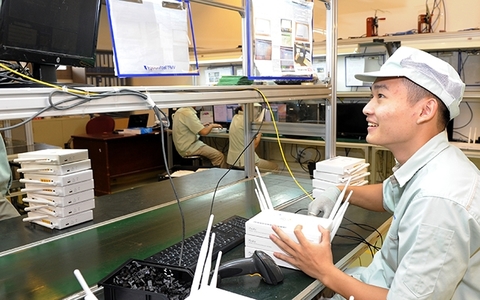 |
|
Telecommunications equipment manufactured at VNPT Technology. The foreign direct investment into electronics should aim to promote local companies and enable them to engage in the global value chain. — nhandan.com.vn
|
Foreign direct investment (FDI) into electronics should aim to promote local companies and enable them to engage in the global value chain, industry insiders have said.
Truong Thi Chi Binh, Deputy President of the Viet Nam Association of Supporting Industries, said the FDI wave into Viet Nam had brought significant opportunities for domestic producers to participate in FDI companies’ supply chains.
However, the fact was that most domestic companies were of small scale and poor capacity and few could meet the requirements of big corporations, Binh said. The production cost of electronic components of Viet Nam was often higher than in China and Thailand.
Binh said a large number of FDI investors came to Viet Nam to enjoy preferential policies in investment attraction and from free trade agreements, adding that the supporting industry in general and the electronics industry in particular struggled to take advantage of opportunities from FDI inflow.
Do Thi Thuy Huong from the Viet Nam Electronic Industries Association said electronic industry development required a huge investment in technology and high-quality labour.
Huong said training programmes at schools and universities were not suitable and remained more theoretical than practical and used mostly outdated machines.
Luu Hai Minh, chairman of Nhat Hai New Technology Joint Stock Company, said firms were still facing difficulties in accessing support policies from the Government. He said companies needed capital to invest in developing new technologies.
The electronic industry of Viet Nam is heavily dependent on FDI.
With an average annual growth rate of 50 per cent in 2010-18, the electronic industry’s exports reached US$84 billion in 2018, making Viet Nam the 12th biggest exporters of electronic products in the worth and 3rd in ASEAN. However, the FDI sector accounted for some 95 per cent of the country’s export revenue.
Nguyen Dinh Hung, chairman of EDX Corporation Group, said technology transfer and environmental protection should be important factors in attracting FDI.
According to Binh, the Government should have a new approach in negotiating supply with multinational companies. Detailed plans to develop supporting industries should also be built with incentive policies for investments in technologies, she said.
For the long term, Binh said FDI inflow must promote the development of local producers and enable them to engage in global value chains.
Prime Minister Nguyen Xuan Phuc has founded a working group in charge of attracting foreign investment in the context of the global production shift away from China spurred by the trade war and the COVID-19 pandemic.
The group will work with multinational and hi-tech corporations and those who lead the value chains for investment co-operation.
However, Viet Nam will be selective in attracting FDI with a focus on big multinational corporations and those with modern and environmentally-friendly technology.
According to the Viet Nam Foreign Investment Agency, FDI in the first five months of this year totalled $13.9 billion, down 17 per cent against the same period last year due to the impacts of the pandemic. Disbursed capital also fell by 8.2 per cent to $6.7 billion.
Viet Nam has so far attracted $376.6 billion in FDI with a disbursement rate of 58 per cent. The processing and manufacturing industry attracted more than 58 per cent of the total FDI into the country. — VNS

Electronic technology will help improve fisheries management in VN
While using technology to supervise fishing vessel operations has proven an effective way to manage fisheries in Vietnam, several localities are struggling to use the technology, experts have said.

Electronics, seafood and garment industries to benefit the most from EVFTA
Vietnam is the second country in Southeast Asia, following Singapore, that has signed an FTA with the EU.